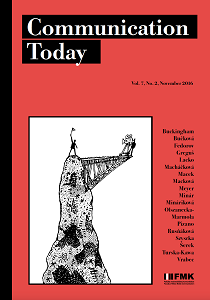Historical Reflection on Game Principle Alea and Its Presence in Virtual Reality
Historical Reflection on Game Principle Alea and Its Presence in Virtual Reality
Author(s): Zuzana BučkováSubject(s): Social Sciences, Communication studies, Ancient World
Published by: Univerzita sv. Cyrila a Metoda v Trnave, Fakulta masmediálnej komunikácie
Keywords: cyberspace; digital games; game; game principle alea; game principles; games of chance; virtual reality
Summary/Abstract: The study deals with theoretical and historical reflection on the game principle alea and discusses the current trends in applying this game principle in the virtual reality. The key theoretical framework of the text is the typology of game principles by the French sociologist R. Caillois as well as works by other authors who deal with ludological principles. The essence of the theoretical reflection is examining historical development of the above-mentioned game principle and contemplating the use of key features of the principle in the present-day virtual reality, particularly in digital games. The author focuses mainly on the current digital games working with the alea principle; mainly on online games of chance and their alternatives. The terminological axis is based on the terms “virtual reality”, “game”, “digital game”, “game principles” and the “alea principle”. The key objective of this study is to clarify the current understanding of alea on the basis of logical analysis, i.e. to point out its evident occurrence in the media environment, more specifically in the dimension of digital games. The author mentions various metamorphoses of the game principle alea, taking into consideration the historical background of media evolution. The ambition of the text is not only to understand and interpret the examined reality, but mainly to specify how the alea principle interacts with the environment of virtual reality and digital games. The study works with an assumption that the analysed game principle alea has been present in the human society since the times of the Ancient Rome – its occurrence in today’s social and/or individual games experienced in the everyday reality is evident. The author also presumes that R. Caillois’s theoretical postulates are still timely and widely usable – also in new contexts such as the present-day media reality of digital games.
Journal: Communication Today
- Issue Year: 7/2016
- Issue No: 2
- Page Range: 30-45
- Page Count: 16
- Language: English

